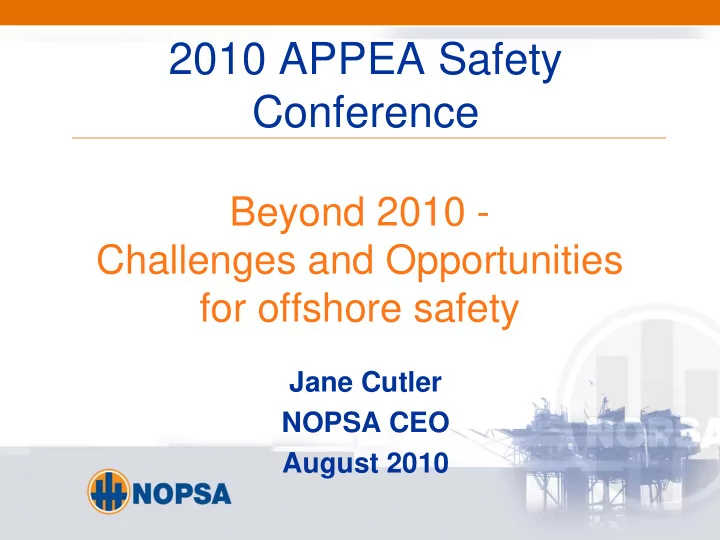

2010 APPEA Safety Conference Beyond 2010 - Challenges and Opportunities for offshore safety Jane Cutler NOPSA CEO August 2010
2002 MCMPR principles • Consistent national approach in both Commonwealth & State/NT waters • Safety Case • Legislative framework operators to discharge their responsibilities for safety • Independent approach legislative responsibilities & dealings with industry • Cost recovery 2 2
NOPSA’s functions 3 Report Investigate Co-operate Advise Promote Monitor & Enforce
Legislation amendments Australian Offshore OHS • Schedule 3 to the Offshore Petroleum Offshore Petroleum and Greenhouse Gas Storage Act and Greenhouse Gas Storage Act 2006 (OPGGSA) • Offshore Petroleum (Safety) Regulations 2009 Schedule 3 Available at www.comlaw.gov.au State waters arrangements may not Offshore Petroleum and Greenhouse Gas Storage be fully aligned with Commonwealth (Safety) Regulations 2009 waters 4
INDUSTRY NOPSA 2009-10 33 Operators 33 OHS Inspectors Activities 170 Facilities 20 Support staff 180 Assessments 180 Assessments 366 Incidents 94 Inspections 38 Accidents 328 Dangerous Occurrences 6 Major Investigations 93 Minor Investigations 267 Incident reviews 28 Enforcement actions 5
Focus Areas • Process Safety Culture • Asset Integrity / Aging Facilities • Maintenance management • Emergency response • Contractor management 6
Assessments Assessments Submitted by type Request for Exemption 250 Scope of Validation 200 Field Devt Plan Pipeline SMS Revised Number 150 Pipeline SMS New / Proposed 100 Diving SMS Revised Diving SMS New 50 Safety Case Revised 0 Safety Case New 2005 2006 2007 2008 2009 1/1/10 to 30/6/10 7
Inspections Number of Inspections per year 100 90 80 70 60 Number 50 40 30 20 10 0 2005 2006 2007 2008 2009 1/1/10 to 30/6/10 8
Enforcements Number of Enforcement Actions per year 70 60 50 40 Number 30 20 10 0 2005 2006 2007 2008 2009 1/1/10 to 30/6/10 9
Dangerous Occurrences Rate Dangerous Occurrences Rate Per million hours 30 per million hours 25 20 15 Rate 10 5 0 2005 2006 2007 2008 2009 1/1/10 to 30/6/10 10
Dangerous Occurrences Root Causes 2005 2006 2007 2008 2009 1/1/10 to 30/6/10 Procedures - Preventive Procedures - Preventive Procedures - Procedures - Not Followed Maintenance Not Followed Maintenance Not Followed Not Followed Preventive Mgmt System Preventive Procedures - Preventive Design Specs Maintenance - SPAC Maintenance Not Followed Maintenance Procedures - Preventive Design Specs Design Specs Training Design Specs Not Followed Maintenance 11
Injuries (TRC) Rate Injuries Rate Per million hours per million hours 16 12 Rate 8 4 0 2005 2006 2007 2008 2009 1/1/10 to 30/6/10 12
Accidents Rate Accidents Rate Per million hours 5 per million hours 4 3 Rate 2 1 0 2005 2006 2007 2008 2009 1/1/10 to 30/6/10 13
Accidents Root Causes 2005 2006 2007 2008 2009 1/1/10 to 30/6/10 Work Human Procedures - Procedures - Procedures - Training - Direction - Engineering Not Followed Not Followed Not Followed Understanding Preparation Work Procedures - Training - Training - Training - Procedures - Direction - Not Followed Understanding None Understanding Not Followed Preparation Work Training - Human Human Human Procedures - Direction - Understanding Engineering Engineering Engineering Wrong Preparation 14
Hydrocarbon Releases Liquid >12500 L 35 Liquid >80 ‐ 12500 L Gas >300 kg Gas >1 ‐ 300 kg 30 25 20 Number 15 10 5 0 2005 2006 2007 2008 2009 1/1/10 to 30/6/10 15
HC Releases - Equipment ALL Facilities ‐ Equipment Involved in HC Releases Engines (Gas and Liquid) Unspecified Tank Instruments Other Pumps/Compressors Joints/Flanges Gaskets/Seals Pipes/Tubes Valves/Vents 0 5 10 15 20 25 30 35 40 2005 2006 2007 2008 2009 2010 16
HC Release Root Causes 2005-2010 2010 Significant Major Significant Major Preventive Design Design Quality Control Maintenance Preventive Preventive Preventive Procedures Maintenance Maintenance Maintenance Equipment Procedures Design Parts / Defects 17
Safety Culture "Safety culture is how the night shift operates when it is alone without management watching". 18 Ref: J-M Jaubert, Total, The Chemical Engineer, August 2010
Safety Culture Facility Score Aggregate Facility Score Process Safety Culture Survey 1 2 3 4 Facility 5 6 7 8 Average to date 0 100 200 300 400 500 600 700 800 19
Safety Culture - Training 20 100 80 60 40 20 0 International Industry Average Benchmark
Safety Culture - Training 21 100 80 60 40 20 0 International Industry Average Benchmark
Safety Culture - Reporting 22 100 80 60 40 20 0 International Industry Average Benchmark
Safety Culture - Reporting 23 100 80 60 40 20 0 International Industry Average Benchmark
Safety Improvement Opportunities ▲ Maintenance ▼ Gas releases ▲ Procedures ▼ Accidents ▲ Training ▲ Safety Culture 24
Montara 25
Montara Gas Release Issues • Primary cementing • Inadequate barriers • Management System failures – Risk Assessment – Communications – Records Management – Executive oversight • Drilling Contractor-Leaseholder Interface 26
Macondo 27
Potential implications • For industry Loss of community trust Insurance & liability Ability of smaller companies & minor partners to pay & survive Which entity is ultimately responsible for safety ??? • For government & regulators Independence of safety regulator Regulatory capture Performance based vs prescriptive requirements Quality of staff / challenge / inspection 28 28
Montara WHP Gas Release - A brief of evidence has been referred to the Commonwealth Director of Public Prosecutions (CDPP) 29
Recommend
More recommend